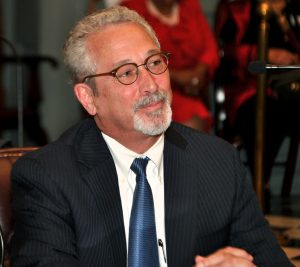Legislation will lead to the creation of a statewide integrated plan to address addiction and mental illness in Delaware
DOVER, Del. – On Thursday, Lt. Governor Bethany Hall-Long announced the creation of the Behavioral Health Consortium in an effort to streamline and foster a coordinated behavioral health system within our state. The consortium, chaired by Lt. Governor Hall-Long, will be comprised of community advocates, law enforcement, state leaders, and healthcare professionals from across Delaware to develop a short-term and long-term unified strategy to deal with one of the largest public health crises’ in Delaware history.
“An average of 20 Delawareans die from overdoses each month.”, said Lt. Governor Hall-Long. “The addiction crisis we face ignores income, race, and geography. Fighting it is a team effort that requires us to stay ahead of the curve, and develop a streamlined approach. I thank Governor Carney for asking me to lead Delaware’s efforts to combat this deadly epidemic and focus on improved delivery and coordination of mental health services for all Delawareans statewide.”
These two pieces of legislation, SB 111 and HB 220, sponsored by Senator Bryan Townsend and Representative David Bentz, will further combat Delaware’s addiction epidemic and improve services for those suffering from mental illness. The legislation will lead to the creation of a Behavioral Health Consortium and an Addiction Action Committee that will form an integrated plan and blueprint for action for the prevention, treatment, and recovery for mental health, substance use and co-occurring disorders in Delaware. The creation of the consortium and coordinated plan is a recommendation of Governor Carney’s Action Plan For Delaware.
“Far too many Delawareans, and Delaware families, have been affected by this crisis,” said Governor John Carney. “This consortium will create a short-term and long-term strategy so that we can better prevent and treat individuals suffering from addiction. Lt. Governor Hall-Long has the experience as a nurse and as an advocate for mental health and substance abuse issues, and I know she will be a committed leader in our efforts to combat Delaware’s addiction epidemic.”
This legislation is an effort to develop a streamlined strategy aimed at reducing overdose fatalities, lessening opioid dependence, expanding treatment options, and increasing prevention and awareness for those struggling with addiction and mental illness in Delaware.
“We know that emotional wellness affects physical health, learning and child development.”, said Josette Manning, Secretary of the Department for Children, Youth, and their Families. “We also know that when children are born substance exposed or grow up in the shadows of addiction, the impacts are often severe and lifelong. If we want to improve outcomes for our families, it is crucial that we take a coordinated approach to addiction, behavioral health and prevention services. The Children’s Department is pleased to participate in this public-private partnership to increase awareness, improve access, and enhance the quality of services for children and families.”
The creation of the Addiction Action Committee will develop and monitor a coordinated and comprehensive approach to Delaware’s addiction epidemic. The committee is the next step for the Prescription Drug Action Committee which has been partnership since 2012 between the Division of Public Health, Medical Society of Delaware, and numerous other public and private agencies. The group has worked to increase physician and community education on opioids and permanent drug take-back locations, supported the efforts of the Division of Professional Regulation to tighten prescribing rules, and played an advisory role in the creation of the Help is Here website and campaign.
Last year, 308 people died of overdoses, up 35 percent from the 228 total deaths in 2015.
“We need an ‘all-hands-on-deck’ approach to fighting the addiction epidemic and, at DHSS, we see how often mental health issues and substance abuse disorders occur together,” said Department of Health and Social Services Cabinet Secretary Dr. Kara Walker. “We must examine our response to the epidemic, use the new tools created by this legislation, and increase coordination across the system so we better connect people to the treatment they need when they are ready. DHSS is pleased to be part of this effort and looks forward to working with the Lt. Governor.”
“There’s virtually no one in Delaware who hasn’t been affected by substance abuse or, more broadly, by mental and behavioral health issues,” said Senate Health, Children and Social Services Committee Chair Sen. Bryan Townsend, D-Newark. “Countless state agencies, nonprofits, advocates, businesses, survivors, and families have stepped up to raise awareness of behavioral health issues, reduce stigma, close gaps in care, change policy, and save lives. This package would not only add their efforts together, but multiply them by breaking down silos, coordinating their work, and pooling all of their unique backgrounds, resources, and perspectives around a common—and urgent—goal.”
“In 2001, Delaware committed to addressing its cancer rates—then some of the worst in the nation—through the formation of the Delaware Cancer Consortium, among several other efforts,” said President Pro Tempore Sen. David McBride, D-Hawk’s Nest. “The Consortium’s work has paid enormous dividends—I can attest to that firsthand. Today there’s a new health crisis, and it’s incumbent on Delaware to pull out every stop now, as we did then, to reverse the tide of the addiction epidemic. I’m proud to lend my support to that effort.”
“Delaware has taken some important strides forward regarding the addiction epidemic that has hit communities up and down our state, but we must do more,” said Representative David Bentz, who chairs the House Health Committee and is sponsoring the bill. “By bringing together government leaders, healthcare professionals and members of the drug treatment and pharmaceutical communities, we will be able to effectively identify ways to combat the addiction crisis. I look forward to advancing this legislation in the coming days.”
###

